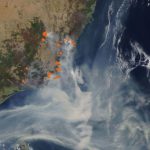 March 8, 2021 1:54 pm
Published by Climate Extremes
March 8, 2021 1:54 pm
Published by Climate Extremes
As part of the Future Seas project, this paper summarizes knowledge and perspectives on ocean literacy from a range of disciplines, including but not exclusive to marine biology, socio-ecology, philosophy, technology, psychology, oceanography and human health.
 March 5, 2021 1:19 pm
Published by Climate Extremes
March 5, 2021 1:19 pm
Published by Climate Extremes
CLEX researchers found coastal marine heatwave hotspots were concentrated along the Mediterranean Sea, Japan Sea, south‐eastern Australia and the north‐eastern coast of the United States. They also found the frequency of these events and their duration globally increased by 1–2 events per decade and 5–20 days per decade. Most of the marine heatwave hotspots identified were associated with high upward trends.
 March 5, 2021 11:19 am
Published by Climate Extremes
March 5, 2021 11:19 am
Published by Climate Extremes
The most intense and destructive tropical cyclones generally go through a period of rapid intensification, where "rapid" means that the near-surface winds increase by more than 15 m/s (54km/hr) in 24 hrs. However, the physical processes by which storms rapidly intensify are not well understood. This study uses very high-resolution simulations with the UK Met Office Unified Model of the 2016 north-Pacific tropical cyclone, Nepartak, to explore the processes responsible for its rapid intensification.
 March 3, 2021 3:45 pm
Published by Climate Extremes
March 3, 2021 3:45 pm
Published by Climate Extremes
The largest rivers on Earth are not on the ground, but in the sky. Our new study, published in Environmental Research Letters, showed that nine out of ten of the most expensive floods in New Zealand (2007-2017) occurred during an Atmospheric River event, and seven to all ten of the top ten most extreme rainfall events at eleven different locations occurred during Atmospheric Rivers.
 February 15, 2021 1:22 pm
Published by Climate Extremes
February 15, 2021 1:22 pm
Published by Climate Extremes
There is a great deal of misuse of climate model projections emerging in business. Climate models are being used for some purposes that are simply inappropriate leading to assessments of the physical risks to business that are of no value. However, there are ways to use climate model data that has value and can help business robustly assess some specific climate related risks.
 February 12, 2021 2:05 pm
Published by Climate Extremes
February 12, 2021 2:05 pm
Published by Climate Extremes
In this study, the researchers propose a reporting format for leaf-level gas exchange data and metadata to provide guidance to data contributors on how to store data in repositories to maximise their discoverability, facilitate their efficient reuse, and add value to individual datasets.
 February 12, 2021 11:35 am
Published by Climate Extremes
February 12, 2021 11:35 am
Published by Climate Extremes
CLEX researchers and colleagues quantified the air quality impact of the Black Summer bushfires of 2019/20 and COVID-19 in the south-eastern states of Victoria and New South Wales (NSW) using a meteorological normalisation approach.
 February 12, 2021 10:01 am
Published by Climate Extremes
February 12, 2021 10:01 am
Published by Climate Extremes
The majority of heatwaves affecting south-eastern Australia are part of large and strong weather systems propagating across Australia, and not due to stationary or blocked weather systems as seen in some other regions of the world.
 February 11, 2021 10:14 am
Published by Climate Extremes
February 11, 2021 10:14 am
Published by Climate Extremes
Storms cause ripples in the wind that travel upwards and away from the clouds, much like a stone causes ripples when it is thrown in a pond. These can then affect the temperature and winds around the storms and make them grow, last longer, or die earlier.
 February 10, 2021 2:18 pm
Published by Climate Extremes
February 10, 2021 2:18 pm
Published by Climate Extremes
The researchers analysed the performance of the ACCESSS1 seasonal forecast model to predict the SPCZ position and rainfall over the period 1990-2012. ACCESSS1 performed better in simulating the SPCZ than the previous model, POAMA.










